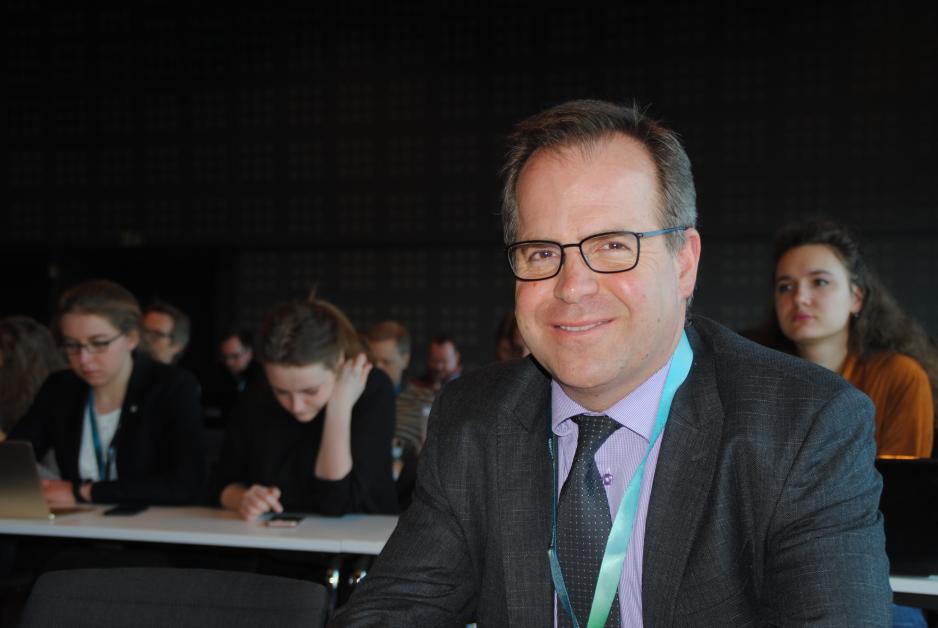- We do not fight each other in the Arctic

- It is in our nature to help each other in the Arctic, not to fight. History has showed us that it is a tradition.
Professor Michael Byers at the University of British Columbia in Canada is quite convinced; we will not fight each other in the Arctic. At the High North Dialogue conference in Bodø (Norway) this week, he told the audience that fighting is against the Arctic traditions – and will remain so.
- How did this become a tradition?
- It is a tradition that arouse out of the remote nature of the Arctic, the extreme weather conditions, the danger that is involved in living and working in the Arctic. So Arctic, indigenous people are extremely cooperative people.
No word for anger
Let me just give you an example: In Canada, among the Inuits, in their own language, there is no word for anger. That is because you cannot afford anger in the Arctic – you are sharing an igloo, there are 50 sub-zero degrees outside, there are polar bears – everyone has to work together.
Therefore, they never say that they are angry, that’s not a word they understand. They can be disappointed or frustrated, but anger is not a part of the Arctic intellectual landscape.
- Taking the geopolitical situation that we have now into consideration, do you think or feel that this tradition and attitude trumps the national interests?
You don't survive alone
- Let me just point out, before asking that, that the Russian President has taken the same view. We heard him speak in Moscow in 2010, as he said that if you are standing alone in the Arctic, you will not survive. And he repeated something quite similar just last week in Arkhangelsk.
So yes, we see this. We saw it during the Cold War, when things were very tense between NATO and the Soviet Union, there was still cooperation. In 1973 we negotiated the Polar Bear Treaty, to prohibit the use of helicopters and icebreakers when hunting polar bears, in order to save that species.
After the Cold War, we have seen cooperation on things like search and rescue (SAR), with an agreement reached in 2011 between all the Arctic countries. And then there is, of course, the incredible cooperation between Norway and Russia on things like fisheries management in the Barents Sea, which started more than four decades ago.
It didn't stop with Ukraine
Professor Byers adds that the crises in Ukraine has not stopped many of these different cooperations.
- But what about the missing high-level contacts? When the foreign ministers Sergej Lavrov from Russia and Børge Brende from Norway met last week, it was three years since they had last met and talked?
- Well, I am a political scientist, and I have some understanding of how governments work. The most important conversations are the ones that take place between the professional civil servants – who are two or three levels below the ministers.
As long as they talk...
They are the experts, who deal with the practical matters. The speeches (of the ministers) are important, because they set a public tone, send a public message. But as long as the senior civil servants, the military officers, the coast guard officers are still talking together, the most part of the relationship is still functioning.
- Some people in the Northern Norway would say that the further away from the Russian border you get, the more you will fear the Russians. Is there any truth to that phrase?
- Yes, this is well known. We are always afraid of the things that we do not know. We see it everywhere. For example, in the American elections, the people who are most afraid of immigrants where those who lived in communities with no immigrants.
Knowledge is the key
Knowledge is the key, here as elsewhere. People who live close to the border to Russia know that their cooperation is necessary, they know individual Russians and we are all human beings in the end, and can have friendships, trust and relationships across borders.
Obviously, international politics is still important, security is still very important, and Russia has behaved very badly in the Ukraine and in Syria. But in terms on the immediate cross-border cooperation in the Arctic, all sides seem to understand that the responsible thing is to continue cooperating, says professor Michael Byers from the University of British Columbia.
Professor Michael Byers teaches at The University of British Columbia, Vancouver, Canada, where he holds the Canada Research Chair in Global Politics and International Law. He has been a Fellow of Jesus College, Oxford University, and a Professor of Law at Duke University. He har also taught as a visiting professor at the universities of Cape Town, Tel Aviv and Novosibirsk.
